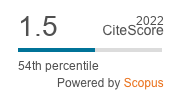The Innovation Gap between the Polish Economy and the European Union
DOI:
https://doi.org/10.18778/1508-2008.23.20Keywords:
innovation, innovativeness, innovation gap, European Innovation Scoreboard (EIS), Summary Innovation Index (SII)Abstract
Knowledge and innovations are considered to be among the most important factors that determine the pace and quality of economic growth. Therefore, Poland is facing a serious challenge to effectively transform its economy into an innovative economy capable of competing with the most developed countries. The aim of the paper is to present the results of analysis aimed at estimating the innovation gap between Poland and the European Union countries on the basis of the Summary Innovation Index (SII), which was developed by the European Commission within the European Innovation Scoreboard (EIS) in the years 2010–2018. It reviewed the literature on the innovativeness of economies and the innovation gap. Descriptive analysis, statistical data analysis and comparative analysis methods were applied. Statistical data from the European Innovation Scoreboard 2019 were used. The paper formulates a research thesis that assumes that the level of innovativeness of the Polish economy in the analyzed period remained at a lower level than the EU average and therefore there is still an innovation gap between the Polish economy and the average for European Union countries. The results of the analysis confirm this thesis.
Downloads
References
Balcerzak, A. (2009), Państwo w realiach „nowej gospodarki”, Wydawnictwo Adam Marszałek, Toruń.
Google Scholar
Diagnoza społeczna 2013. Warunki i jakość życia (2014), Czapiński J., Panek F. (eds.), Warszawa.
Google Scholar
Dworak, E. (2012), Gospodarka oparta na wiedzy w Polsce. Ocena, uwarunkowania, perspektywy, Wydawnictwo Uniwersytetu Łódzkiego, Łódź.
Google Scholar
European Innovation Scoreboard (2019), http://www.proinno-europe.eu/metrics (accessed: 20.07.2019).
Google Scholar
Freeman, Ch. (1982), The Economics of Industrial Innovation, F. Pinter, London.
Google Scholar
Gasz, M. (2015), Kierunki zmian w polityce innowacyjnej w Polsce i Unii Europejskiej, “Studia Ekonomiczne. Zeszyty Naukowe Uniwersytetu Ekonomicznego w Katowicach”, 214.
Google Scholar
Gorynia-Pfeffer, N. (2012), Wybrane aspekty działalności innowacyjnej na przykładzie Niemiec-wnioski dla Polski, “Studia Ekonomiczne”, 2.
Google Scholar
Growiec, J. (2012), Zagregowana funkcja produkcji w ekonomii wzrostu gospodarczego i konwergencji, Oficyna Wydawnicza SGH, Warszawa.
Google Scholar
Kleer, J. (2009), Gospodarka oparta na wiedzy a globalizacja: związki czasowe czy przyczynowe [in:] Kotowicz-Jawor, J. (ed.), GOW – wyzwanie dla Polski, PTE, VIII Kongres Ekonomistów Polskich, Warszawa.
Google Scholar
Kotler, Ph. (1999), Marketing narodów, Profesjonalna Szkoła Biznesu, Kraków.
Google Scholar
Kraciuk, J. (2006), Korporacje transnarodowe a zjawisko luki technologicznej w krajach rozwijających się, “Zeszyty Naukowe SGGW – Ekonomika i Organizacja Gospodarki Żywnościowej”, 61.
Google Scholar
Kubielas, S. (2009), Innowacje i luka technologiczna w gospodarce globalnej opartej na wiedzy. Strukturalne i makroekonomiczne uwarunkowania, Uniwersytet Warszawski, Wydział Nauk Ekonomicznych, Warszawa.
Google Scholar
Mielcarek, P. (2013), Luka innowacyjności polskiej gospodarki względem Unii Europejskiej, “Zeszyty Naukowe Uniwersytetu Szczecińskiego, Finanse, Rynki finansowe, Ubezpieczenia Nr 57”, 756.
Google Scholar
National Systems of Innovation (1992), Lundvall B.-A. (ed.), Printer Publishers, London.
Google Scholar
Okoń-Horodyńska, E. (2004), Co z Narodowym Systemem Innowacji w Polsce?, [in:] Okoń-Horodyńska, E. (ed.), Rola polskiej nauki we wzroście innowacyjności gospodarki, Polskie Towarzystwo Ekonomiczne, Warszawa.
Google Scholar
Orłowski, W.M. (2013), Komercjalizacja badań naukowych w Polsce. Bariery i możliwości ich przełamania, PWC, Warszawa, lipiec 2013.
Google Scholar
Pawlik, A. (2014), Dystans innowacyjny województw, Wydawnictwa Uniwersytetu Jana Kochanowskiego, Kielce.
Google Scholar
Porter, M. (2001), Porter o konkurencji, PWE, Warszawa.
Google Scholar
Raport o partnerstwie publiczno-prywatnym w Polsce, (2013), Hausner, J. (ed.), Centrum Partnerstwa Publiczno-Prywatnego, Warszawa, lipiec.
Google Scholar
Skawińska, E., Zalewski, R.I. (2009), Klastry biznesowe w rozwoju konkurencyjności i innowacyjności regionów. Świat-Europa-Polska, PWE, Warszawa.
Google Scholar
The Global Competitiveness Report 2018–2019, Schwab, K. (ed.), World Economic Forum, Geneva.
Google Scholar
Weresa, M.A. (2014), Polityka innowacyjna, Wydawnictwo Naukowe PWN SA, Warszawa.
Google Scholar
Witkowska, J., Wysokińska, Z. (2006), Umiędzynarodowienie małych i średnich przedsiębiorstw a procesy integracji europejskiej. Aspekty teoretyczne i empiryczne, Wydawnictwo Uniwersytetu Łódzkiego, Łódź.
Google Scholar
Zacher, L. (2007), Transformacje społeczeństw od informacji do wiedzy, C.H. Beck, Warszawa.
Google Scholar
Downloads
Published
How to Cite
Issue
Section
License

This work is licensed under a Creative Commons Attribution-NonCommercial-NoDerivatives 4.0 International License.











